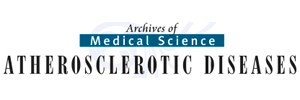SYSTEMATIC REVIEW
Usefulness of resveratrol supplementation in decreasing cardiometabolic risk factors comparing subjects with metabolic syndrome and healthy subjects with or without obesity: meta-analysis using multinational, randomised, controlled trials
1
Institute of Biomedical and Pharmaceutical Sciences, Key Laboratory of Fermentation Engineering (Ministry of Education), Hubei Provincial Cooperative Innovation, Center of Industrial Fermentation, Hubei Key Laboratory of Industrial Microbiology, Hubei University of Technology, Wuhan, China
2
Tianyou Hospital, Wuhan University of Science and Technology, Wuhan, Hubei, China
3
Department of Laboratory Medicine and Pathology, Faculty of Medicine and Dentistry, University of Alberta.
Edmonton, Alberta, Canada
4
Department of Pediatrics, Stollery Children’s Hospital, Edmonton, Alberta, Canada
Submission date: 2019-12-22
Final revision date: 2020-04-15
Acceptance date: 2020-04-18
Publication date: 2020-05-30
Arch Med Sci Atheroscler Dis 2020;5(1):98-111
KEYWORDS
TOPICS
ABSTRACT
Introduction:
Resveratrol (RES), a natural polyphenolic compound, has been linked to some beneficial effects against cardiovascular disease (CVD).
Material and methods:
We conducted a systematic search to conduct a meta-analysis on cardiometabolic risk factors modulated by RES targeting patients with metabolic syndrome (Met-S) and Obese/Healthy (O/H) subjects. The PICO (Patient, Intervention, Comparison, Outcome) research question was: Does RES among patients with Met-S and O/H subjects reduce the cardiometabolic risk? The first group was affected with MetS, which is defined as a clustering of abdominal obesity, dyslipidaemia, hyperglycaemia, and hypertension in a single individual. The second group was composed of ‘obese/healthy’ individuals, i.e. healthy subjects with or without obesity. We performed a literature search of MEDLINE/ PubMed, Scopus, and Google Scholar for randomised, controlled trials (RCT) that estimated the effects of RES on cardiometabolic risk factors.
Results:
We found 780 articles, of which 63 original articles and reviews were identified. Data from 17 well-conducted RCT studies, comprising 651 subjects, were extracted for analysis. Overall, RES had a significant influence on Homeostatic Model Assessment-Insulin Resistance (HOMA-IR), resulting in a mean difference of –0.520665 (95% CI: –1.12791; –0.01439; p = 0.00113). In Met-S, RES significantly reduced glucose, low-density lipoprotein-cholesterol (LDL-C), and total cholesterol (T-Chol) as detected by the mean difference of –1.069 (95% CI: –2.107, –0.032; p = 0.043), –0.924 (95% CI: –1.804, –0.043; p = 0.040), and –1.246 (95% CI: –2.314, –0.178; p = 0.022), respectively.
Conclusions:
Despite some heterogeneity in the populations, RES supplementation seems to improve cardiometabolic health, decreasing some risk factors (HOMA-IR, LDL-C, and T-Chol) associated with CVD.
Resveratrol (RES), a natural polyphenolic compound, has been linked to some beneficial effects against cardiovascular disease (CVD).
Material and methods:
We conducted a systematic search to conduct a meta-analysis on cardiometabolic risk factors modulated by RES targeting patients with metabolic syndrome (Met-S) and Obese/Healthy (O/H) subjects. The PICO (Patient, Intervention, Comparison, Outcome) research question was: Does RES among patients with Met-S and O/H subjects reduce the cardiometabolic risk? The first group was affected with MetS, which is defined as a clustering of abdominal obesity, dyslipidaemia, hyperglycaemia, and hypertension in a single individual. The second group was composed of ‘obese/healthy’ individuals, i.e. healthy subjects with or without obesity. We performed a literature search of MEDLINE/ PubMed, Scopus, and Google Scholar for randomised, controlled trials (RCT) that estimated the effects of RES on cardiometabolic risk factors.
Results:
We found 780 articles, of which 63 original articles and reviews were identified. Data from 17 well-conducted RCT studies, comprising 651 subjects, were extracted for analysis. Overall, RES had a significant influence on Homeostatic Model Assessment-Insulin Resistance (HOMA-IR), resulting in a mean difference of –0.520665 (95% CI: –1.12791; –0.01439; p = 0.00113). In Met-S, RES significantly reduced glucose, low-density lipoprotein-cholesterol (LDL-C), and total cholesterol (T-Chol) as detected by the mean difference of –1.069 (95% CI: –2.107, –0.032; p = 0.043), –0.924 (95% CI: –1.804, –0.043; p = 0.040), and –1.246 (95% CI: –2.314, –0.178; p = 0.022), respectively.
Conclusions:
Despite some heterogeneity in the populations, RES supplementation seems to improve cardiometabolic health, decreasing some risk factors (HOMA-IR, LDL-C, and T-Chol) associated with CVD.
Share
RELATED ARTICLE
We process personal data collected when visiting the website. The function of obtaining information about users and their behavior is carried out by voluntarily entered information in forms and saving cookies in end devices. Data, including cookies, are used to provide services, improve the user experience and to analyze the traffic in accordance with the Privacy policy. Data are also collected and processed by Google Analytics tool (more).
You can change cookies settings in your browser. Restricted use of cookies in the browser configuration may affect some functionalities of the website.
You can change cookies settings in your browser. Restricted use of cookies in the browser configuration may affect some functionalities of the website.


